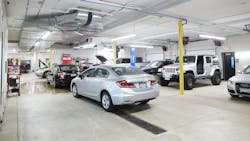One surefire way to ensure the loss of a customer is through disorganized, unclear and frustrating customer service.
Good customer service makes potential customers turn into lifelong clients and want to tell everyone they know to do business with your shop. Bad customer service will make people rant negatively on social media about your shop. It's hard to convince someone otherwise once they've been exposed to a negative review.
Breaking news: shops are busy these days. Post-COVID, cars need auto body work, and some shops and technicians never returned from the pandemic. This has created a situation in which shop schedules are crowded to unprecedented levels.
"Many of us in the collision repair industry are facing similar challenges and battles. Some of us face even greater difficulties," says Dominic Martino, president and co-owner of Gold Coast Auto Body. "Properly scheduling customers has become critical to our ability to deliver an exceptional experience. It's not only parts and technician issues—we are seeing escalated insurer pushback and understaffing that is creating delays and under-indemnification of the loss."
How a shop handles crowded schedules, especially in a time of long-range bookings, is important. It's essential for shops to manage expectations with customers and fill their schedule when long-range appointments don't work out. Here's how.
Over-Communicate
Businesses may tend to think they're communicating enough when the reality is that customers prefer over-communication when it comes to their vehicles.
One of the best strategies for managing customer expectations is over-communicating everything the customer needs to know about their vehicle, timelines, updates, your process and everything in between.
Did an unplanned issue come up? Will you need their vehicle longer? Whatever the problem or pleasant news is, communicate and over-communicate with your customers. This helps manage a customer's expectations and resets the timeline in their mind.
"We are very transparent with our guests and share as much information as possible so they are crystal clear on the communication aspect of the repair process,” says Martino. “We sometimes have to perform some minor disassembly to identify any possible hidden damage to anticipate any potential parts issues before scheduling a repair. One hundred percent transparency with accurate, up-to-date information is critical."
Use Software and Automation
We're living in the digital information age in which software, the internet and automation make it possible and easier to communicate, schedule and deliver for your clients.
Use software to schedule appointments and automate communication with updates, information clients need to know and unexpected changes. The automation part means you can pre-schedule and have this communication and scheduling software running 24/7.
If your shop's schedule becomes overwhelming, the software and automation can help alleviate the congestion. Take some time to look at the software options that make sense for your shop, and either you or one of your team members can set it up.
The software can help you manage long-term bookings and replace any that cancel. The software allows you to manage your book and adjust strategies accordingly.
"Organizations need to figure out what they need to do with their team before they can figure out what to do with their customers. There needs to be a central scheduling system," says Jenni Graham, CEO of JCHIC LifeStyle Brand, a business consultancy that's worked with over 500 businesses on their scheduling and operations. "They need to use more scheduling tools and software such as calendars, dashboards and charts on the inside to manage customers on the outside with clarity and organization. The software can make updates in real-time so that everyone involved is aware and customers get notifications in real-time. Consistency across the board reduces errors."
Own Up to Mistakes
You build trust with your customers by keeping your word and admitting when you've done wrong. Trust is easy to lose and results in lost customers. Trust is not just an idea; it's a business strategy that creates lifelong customers.
If there's a mistake in your shop—whether yours or an employee's—it's important to own up to that mistake. If you over schedule, don't have parts, a vehicle takes longer than expected, or anything else a customer needs to know, own up to the error.
Crowded schedules mean there's a good chance things won't work out as planned. Manage customer expectations and create long-term bookings by being clear, transparent and owning up to mistakes.
“One major problem is that companies need to get their employees involved more,” says Graham. “They have to get the employees involved and get employee feedback. Involve employees in the scheduling process; more training on ensuring they know how these things work will lead to fewer customer expectations issues.”
Appropriately Respond to Customer Complaints
You can't always meet customer expectations 100%, especially in a time when so much is out of a shop's control when it comes to timing. When those expectations aren't satisfied, there will be complaints. If you respond with emotions or in the moment, you risk turning a fixable issue into a mark on your shop that loses customers.
Potential customers know mistakes and errors happen; what they'll be looking at is how a shop responds. Customer expectations are managed, and shop owners must handle customer issues with patience and understanding.
Always Be Marketing
The reality is that you'll lose business from time to time, no matter how well you perform for customers. One of the best ways to keep your long-term book full is always to be marketing.
Good marketing keeps potential customers coming in, and then you hook them with excellent service. Whether using social media ads or word-of-mouth marketing, shops must keep their marketing channels continually operating to keep their long-term book full.
You can hire an agency, pay for ads yourself, ask customers for referrals, offer incentives and discounts for repeat business or referrals, use content marketing, pay for direct mail and many other forms of marketing to fill your long-term bookings and ensure your revenue doesn't skip a beat if you get cancellations.
"We focus on what's working and what's not with businesses. You need to evaluate what's good, go back to the KPIs, and make sure they align with your overall goals. Poor communication in marketing, within your team, or customers will lose business. Use tools and metrics to ensure top-notch marketing and communication," says Graham.
Running a shop is not easy, and many factors make a shop successful. Managing your customer's expectations is an integral part of that success. You create long-term bookings and a schedule full of long-term clients when you give customers world-class service.



